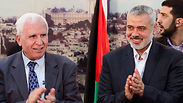

In recent years we no longer see it, perhaps because of its resemblance to the slogan of our neighbors' national liberation movement: "With blood and fire we will redeem Palestine."
The two national movements, the Hebrew one and the Palestinian one, were founded at around the same time, and they were both marginal movements in the two nations at first. Later on, when the nationalism idea captivated the public's consciousness, an internal battle took place in both of them between the radicals and the moderates.
There is something ironic in the fact that our radicals' ideological successors argue that the reconciliation between Fatah and Hamas serves as a reason for stopping the peace talks.
The Peel Commission's partition proposal in 1937 and the United Nations Partition Plan in 1947 were accepted by the moderates in the Yishuv (the Jewish population of Israel prior to the state's establishment) as the lesser of two evils, while the radicals denounced them: Irgun Commander Menachem Begin called David Ben-Gurion a "traitor" for supporting the establishment of a divided state which did not even include Jerusalem, and promised that he would be put on trial by the people.
The tension between radicals and moderates did not reflect a division between right and left. Hashomer was founded by members of the socialist Poalei Zion party, and one of those opposing Ben-Gurion's stance on the partition from the left was Yitzhak Tabenkin, the leader of Hakibbutz Hameuhad (a union of several kibbutzim).
According to the Lehi militant group's radical program, "National Revival Principles," which was written by Avraham Stern in 1940, the borders of the future Hebrew state would extend from the Euphrates River to the river of Egypt, the problem of foreigners in the country will be solved by population swaps, and the Temple will be founded in the state upon its establishment. No less.
The troika which commanded the Lehi after Stern's murder was comprised of Nathan Yellin-Mor, Israel Eldad and Yitzhak Shamir, and each of them expressed a different radical ideology. This might be the reason why Lehi supporters included communists and even Arabs.
It's safe to assume that Benzion Netanyahu passed on to his son, Benjamin, the belief in our right to the Greater Israel, and perhaps even left him the poster that every Revisionist house had at the time, which shows the map of the Land of Israel from both banks of the Jordan River with a hand holding a rifle at its center and the caption, "It's all mine!"
An incredibly similar poster hangs today in the homes of Hamas members in Gaza. Despite Hamas' radical statements, Benjamin Netanyahu understands that there is no solution to the conflict between the two people claiming the same land – apart from dividing it into two states.
Ahead of the state's establishment, our radicals and moderates reconciled. The radicals never gave up on the belief in our right to the entire Land of Israel, but gave in to the historical reality.
The slogan "It's all mine" was moved to the stockpile of dreams each nation has, and thanks to that the State of Israel was established without a war between brothers.
It's possible that a similar move is taking place among the Palestinians right now. Their hope for reconciliation between the radicals and moderates among them is our hope too. Reconciliation among them increases the chance for peace between us and them.















